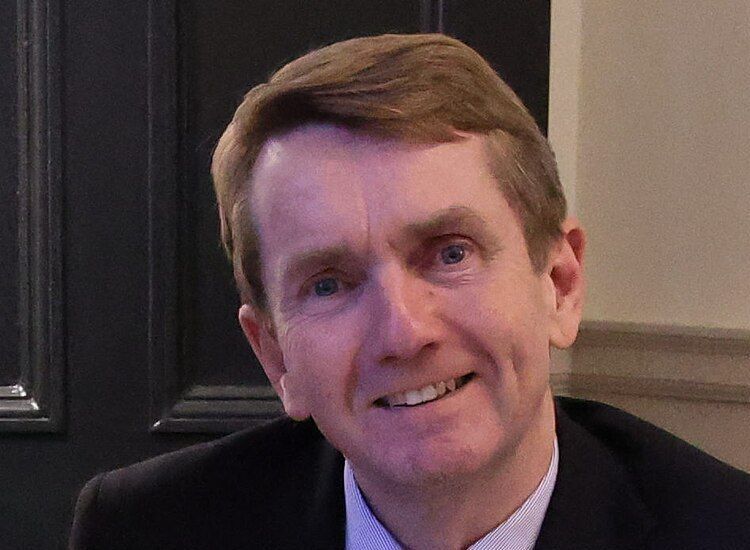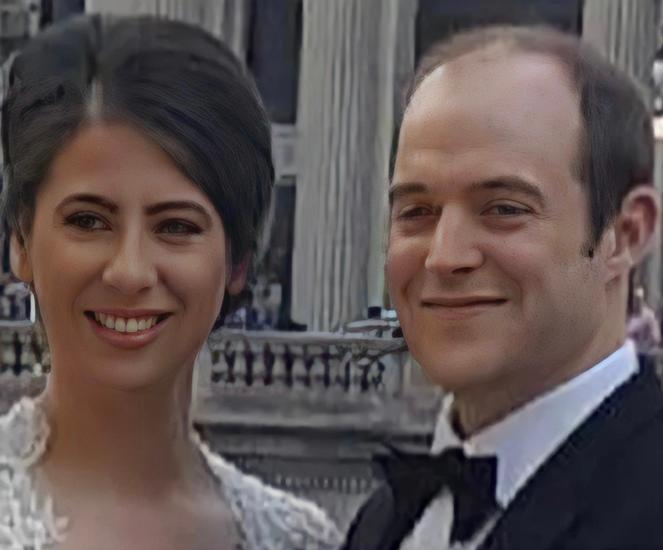By Earle Hitchner
Nov. 17-23, 2010
The professional in me said I should steel myself, even distract myself during the time it would take to deliver a eulogy for my mother, Virginia M. Hitchner, who passed away on November 3 at age 86. No teary pauses, urged my professional training during the funeral Mass inside St. Anastasia Church in Newtown Square, Pa., on the morning of November 9.
But the son in me said I had no choice. This is your mother. You are not a stone or robot, nor did she raise you to be either.
What convinced me to let my emotions slip through was a message I recalled from a journalist friend after my dad passed away on November 1, 2004: "The death of your father will derail you for a long time. Let it." Those words comforted me then, as they did again after my mother's passing.
Also, I was oddly emboldened by two lines in "My Father's Vision, Part Two," a chapter in Gene Weingarten's "The Fiddler in the Subway," a collection of his work for The Washington Post, where he earned Pulitzer Prizes for feature writing in 2008 and 2010. This is what Weingarten wrote: "At my father's funeral, I'd planned to tell the story of his final words. At the last moment I lost my nerve, because I knew I'd break down."
Like my mother, Weingarten's father suffered from dementia. The cruelty of irreversible memory loss emerges painfully in this admission by Weingarten about his father: "He could not remember my mother's first name."
In my eulogy, I was not going to withhold or filter what I remembered about my mother. At the risk of breaking down, I knew my memory had to serve as hers. My mother's final days of disjointed vocalization demanded I convey the coherence and clarity of her life and its impact on those she loved.
I held it together until these four simple words: "I miss her dearly." I wobbled again as I recounted her courage in bearing the worst loss a parent can experience: the death of a child, in this case, my younger sister, Debbie. I thought to myself: I just described my mother's extraordinary resilience under horrific emotional pressure, while I turned briefly to mush. Didn't I learn anything from her example?
Around age two, my mother was placed in St. Vincent's Orphanage, occupied by 500 children and run by the Sisters of Charity in Drexel Hill, Pa. My mother remained there until she was graduated from West Catholic High School for Girls in Philadelphia. Then she went to work as a secretary for the assistant director of purchasing at Sharpe & Dohme (later Merck, Sharpe & Dohme and now just Merck).
Though they knew of each other beforehand, my mother and father didn't really meet until her senior prom, where the two had different escorts but wound up talking most of the night with each other. They became engaged before my father left for the Pacific as an Army Air Corps private who was a top-turret armor gunner on a B-25 during World War Two. He was 20. She was 18. During the three years he was away at war, my mother worked and saved at Sharpe & Dohme. When my father returned from Japan, my mother was making $35 a week -- $5 more than my father made a week. This was a point of pride for her, and she enjoyed needling him about her higher salary.
They married on June 15, 1946, and their first apartment was so small and spartan that they had to brush their teeth over the bathtub. There was no sink. By the time they moved to Blythe Avenue in Drexel Hill, my mother was pregnant with me. My sister Debbie and my brothers James and Joseph were born over the next eight years. I visited the Drexel Hill house a few years ago, and I still wonder how we all fit into such a tiny domicile.
In Bertolt Brecht's play "The Mother" is this line spoken by the title character: "Do not fear death so much, but rather the inadequate life." I have always linked that line to the disposition and wisdom of my own mother. She wanted her children to be happy, to lead full, fulfilling lives. It's the wish of all parents for their children, and I believe it was the wish of my mother's own parents when they relinquished her to a Catholic orphanage. I have no real idea of what my mother must have felt when it dawned on her that the two people placed on earth to protect and love her unconditionally, her parents, had to part with her forever. What she lacked in her own childhood, she gave to her own children unstintingly.
To be human means to try to remember what came before so we can appreciate what we have right now. The best testaments of a life are not found in writing such as this but in family anecdotes and fragments of memory passed along directly and orally to each other. My recollection of my parents' 58 years of marriage is imperfect. But their love for each other and their children is not.
Of my mother, I have more memories than I could ever count or anticipate. She loved to dance, even to my generation's rock music, and she enjoyed listening with me to the big band sounds and singers she grew up with: Artie Shaw, Tommy Dorsey, Harry James, Jo Stafford, Peggy Lee, Ray Eberle, Nat King Cole, and Helen O'Connell, with whom she was often compared in appearance. I told my mother she was prettier, and my father, if he overheard me, would nod his head, causing her to blush or to laugh in disbelief.
That reflexive laughter and other memories of my mother will no doubt come with tsunami force or in slow eddies, and will overwhelm me every time. I'll certainly remember fiddler Brian Conway's poignant solo of the slow air "Were You at the Rock?" beside my mother's grave in the chill breeze and warm sunlight of November 9. Even when I expect or summon these memories, each one will still "catch the heart off guard and blow it open," to borrow from Seamus Heaney's last line in his poem "Postscript."
I plan to let it.
The professional in me said I should steel myself, even distract myself during the time it would take to deliver a eulogy for my mother, Virginia M. Hitchner, who passed away on November 3 at age 86. No teary pauses, urged my professional training during the funeral Mass inside St. Anastasia Church in Newtown Square, Pa., on the morning of November 9. But the son in me said I had no choice. This is your mother. You are not a stone or robot, nor did she raise you to be either. What convinced me to let my emotions slip through was a message I recalled from a journalist friend after my dad passed away on November 1, 2004: "The death of your father will derail you for a long time. Let it." Those words comforted me then, as they did again after my mother's passing. Also, I was oddly emboldened by two lines in "My Father's Vision, Part Two," a chapter in Gene Weingarten's "The Fiddler in the Subway," a collection of his work for The Washington Post, where he earned Pulitzer Prizes for feature writing in 2008 and 2010. This is what Weingarten wrote: "At my father's funeral, I'd planned to tell the story of his final words. At the last moment I lost my nerve, because I knew I'd break down." Like my mother, Weingarten's father suffered from dementia. The cruelty of irreversible memory loss emerges painfully in this admission by Weingarten about his father: "He could not remember my mother's first name." In my eulogy, I was not going to withhold or filter what I remembered about my mother. At the risk of breaking down, I knew my memory had to serve as hers. My mother's final days of disjointed vocalization demanded I convey the coherence and clarity of her life and its impact on those she loved. I held it together until these four simple words: "I miss her dearly." I wobbled again as I recounted her courage in bearing the worst loss a parent can experience: the death of a child, in this case, my younger sister, Debbie. I thought to myself: I just described my mother's extraordinary resilience under horrific emotional pressure, while I turned briefly to mush. Didn't I learn anything from her example? Around age two, my mother was placed in St. Vincent's Orphanage, occupied by 500 children and run by the Sisters of Charity in Drexel Hill, Pa. My mother remained there until she was graduated from West Catholic High School for Girls in Philadelphia. Then she went to work as a secretary for the assistant director of purchasing at Sharpe & Dohme (later Merck, Sharpe & Dohme and now just Merck).Though they knew of each other beforehand, my mother and father didn't really meet until her senior prom, where the two had different escorts but wound up talking most of the night with each other. They became engaged before my father left for the Pacific as an Army Air Corps private who was a top-turret armor gunner on a B-25 during World War Two. He was 20. She was 18. During the three years he was away at war, my mother worked and saved at Sharpe & Dohme. When my father returned from Japan, my mother was making $35 a week -- $5 more than my father made a week. This was a point of pride for her, and she enjoyed needling him about her higher salary. They married on June 15, 1946, and their first apartment was so small and spartan that they had to brush their teeth over the bathtub. There was no sink. By the time they moved to Blythe Avenue in Drexel Hill, my mother was pregnant with me. My sister Debbie and my brothers James and Joseph were born over the next eight years. I visited the Drexel Hill house a few years ago, and I still wonder how we all fit into such a tiny domicile. In Bertolt Brecht's play "The Mother" is this line spoken by the title character: "Do not fear death so much, but rather the inadequate life." I have always linked that line to the disposition and wisdom of my own mother. She wanted her children to be happy, to lead full, fulfilling lives. It's the wish of all parents for their children, and I believe it was the wish of my mother's own parents when they relinquished her to a Catholic orphanage. I have no real idea of what my mother must have felt when it dawned on her that the two people placed on earth to protect and love her unconditionally, her parents, had to part with her forever. What she lacked in her own childhood, she gave to her own children unstintingly. To be human means to try to remember what came before so we can appreciate what we have right now. The best testaments of a life are not found in writing such as this but in family anecdotes and fragments of memory passed along directly and orally to each other. My recollection of my parents' 58 years of marriage is imperfect. But their love for each other and their children is not. Of my mother, I have more memories than I could ever count or anticipate. She loved to dance, even to my generation's rock music, and she enjoyed listening with me to the big band sounds and singers she grew up with: Artie Shaw, Tommy Dorsey, Harry James, Jo Stafford, Peggy Lee, Ray Eberle, Nat King Cole, and Helen O'Connell, with whom she was often compared in appearance. I told my mother she was prettier, and my father, if he overheard me, would nod his head, causing her to blush or to laugh in disbelief. That reflexive laughter and other memories of my mother will no doubt come with tsunami force or in slow eddies, and will overwhelm me every time. I'll certainly remember fiddler Brian Conway's poignant solo of the slow air "Were You at the Rock?" beside my mother's grave in the chill breeze and warm sunlight of November 9. Even when I expect or summon these memories, each one will still "catch the heart off guard and blow it open," to borrow from Seamus Heaney's last line in his poem "Postscript." I plan to let it.









